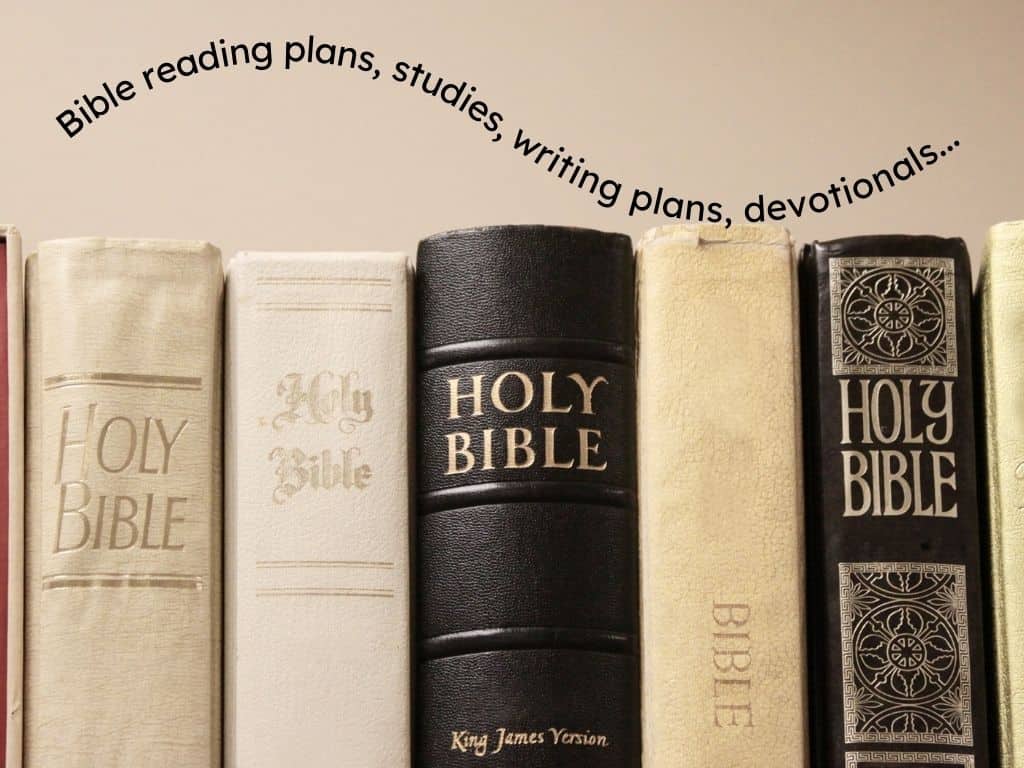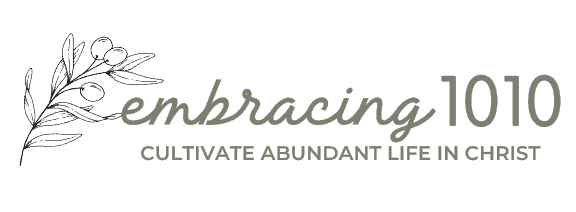Which Method is Right for You? Understanding Bible Studies, Plans, and Devotionals
Spending Time in the Bible
Have you ever been stuck when it comes to where to start reading the Bible? Or maybe you’ve started reading but too soon found yourself putting off, missing days, or getting behind on your goals.
Then you ultimately give up, feeling discouraged and maybe even guilty for not following through. You want to understand God’s Word. You know it’s important for your relationship with him.

Here are a few verses that speak to the significance and value of time in the Word:
- “All Scripture is inspired by God and is useful to teach us what is true and to make us realize what is wrong in our lives. It corrects us when we are wrong and teaches us to do what is right. God uses it to prepare and equip his people to do every good work” (2 Tim 3:16-17, NLT).
- “Oh, the joys of those who do not follow the advice of the wicked, or stand around with sinners, or join in with mockers. But they delight in the law of the LORD, meditating on it day and night. They are like trees planted along the riverbank, bearing fruit in each season. Their leaves never wither, and they prosper in all they do” (Ps 1:1-3, NLT).
- “So get rid of all the filth and evil in your lives, and humbly accept the word God has planted in your hearts, for it has the power to save your souls” (Jam 1:21, NLT).
But the Bible can be daunting, and frankly, it can be hard to understand and stick with a consistent routine. If so, I completely understand and have been there.
This post will lay out the most common methods of engaging with Scripture. I’ll cover what each method looks like, for whom and when it is best, and what are the benefits and limitations of each.
I hope this helps you sort through how you’d like to start engaging in the Bible today. God loves our heart for him and is patiently waiting for us to spend time with him.
But which method you choose should depend on your spiritual season, your emotional needs, and how much time you realistically want or can devote to time in the Bible. Let’s dive in!
Bible Reading Plan
What Is a Bible Reading Plan and Who Is It For?
A Bible reading plan is a structured guide to reading certain portions of the Bible over a set period.
For example, you may have a plan to read through the book of John in 21 days (one chapter each day) or the New Testament in 6 months. Another type of Bible reading plan is a compilation of Scriptural verses on a particular theme or topic such as peace.

The most common Bible reading plans focus on structure, themes, or season. There are so many plans that focus on reading the Bible in one year, or reading the Bible chronologically. You also often see themed plans on topics like faith, grace, love, or prayer; this is a great way to dive deeper into a specific subject and see what the whole Bible has to offer about it. Then there are seasonal plans, most often around Christmas or Easter, such as Advent or Lent Bible reading plans.
As you can imagine, Bible reading plans are great for those believers who want an overview of Scripture on a particular topic or want to digest a portion of it in a discrete time period. It is good for Christians who are busy or have limited time but want to make the Bible a part of their regular time with God. Others who may enjoy these will appreciate them for the consistency and routine that reading plans have to offer.
The Benefits and Limitations of a Bible Reading Plan
First of all, any time in the Word of God is time well spent. When you use a Bible reading plan, that time builds intentional Bible literacy and understanding of Scripture. Additionally, a reading plan also helps you establish daily discipline and routine of being in the Word, which aids spiritual formation over time.
One limitation of a Bible reading plan is that it may not always encourage deep reflection or understanding. And if you aren’t careful, it can feel like checking a box, especially if you are rushed or crunched for time. Relatedly, it is easy to fall behind, leaving you to feel discouraged and for many of us, to give up altogether.
The Takeaway
A Bible reading plan is a great way to spend time in God’s Word, and it is best suited for those who enjoy the structure and consistency it offers, as well as those who have more limited time.
Just be mindful to remain present and not rush through the plan for that day. God is not impressed with a checked box; if you’re good at checking off a list, it may lead to legalism, and on the opposite end of the spectrum, if you struggle with it, you may feel discouraged.
But neither will get you closer to the One who loves you deeply. So take your time!
Bible Writing Plan
What is a Bible Writing Plan and Who Is It For?
A Bible writing plan is a structured set of Scriptures for hand-copying daily. It is often one or more verses (passages) from the Bible and is frequently organized by theme or topic. For example, many Bible writing plans are on topics such as peace or identity in Christ.
In addition to copying Scripture by hand, some plans include journaling or lettering, which are an artistic way of creating letters illustratively. Lettering produces a decorative effect and is made by drawing letters, whereas calligraphy is focused on writing letters.

The most common Bible writing plans are used for meditation or healing. They include topics such as the promises of God, peace and overcoming anxiety, and grounding our identity in Christ. There are others focused on the fruit of the Spirit or wisdom writing through the Proverbs over 31 days.
Bible writing plans are great for visual learners and creatives. It is also a good fit for those who enjoy journaling or writing in general. Also, due to the slowed process that handwriting demands, these plans are wonderful for Christians seeking therapeutic or meditative practices with the Bible. Finally, writing plans are good for those struggling with anxiety or focus because writing slows down the mind, leading you to not only feel calmer but more present and engaged in the Word.
The Benefits and Limitations of a Bible Writing Plan
One of the biggest benefits of a Bible writing plan is the psychological slowing of thoughts and physical slowing of the nervous system, usually experienced as peace and calm.
Associated with that is the fact that a writing plan can lend itself to intentional reflection on shorter passages of Scripture. You can think more meditatively about verses because of the mental space writing causes; that is a rare gift in this day and age of technology always coming at us and filling every second of the day it seems.
Finally, a Bible writing plan can actually aid in the memorization and internalization of Scripture. Whenever you approach material in a multi-modal way (e.g., seeing, hearing, touching, etc.), comprehension and long-term memory storage are increased.
The biggest drawback of a Bible writing plan is that it can be time-consuming. It is so important for us to slow down and take in the Word, but we are not always in that season of life. Sometimes things are just too busy, and another method of engaging with the Bible might be a better fit when you are busier.
Also, writing plans naturally do not provide any context or interpretation, and writing can seem more repetitive than helpful without the added reflection.
The Takeaway
A Bible writing plan is great for slowing down and reflecting on verses as you copy them. And it can be a wonderful method for memorizing Scripture.
Just make sure you have time carved out to devote to Scripture writing (you can keep it to a verse or two at a time if you want!). If you find yourself not stimulated enough, you can mix this method with a more engaging one like a devotional.
Bible Study
What Is a Bible Study and Who Is It For?
A Bible study is what it sounds like – studying the Bible. It is an in-depth examination of Scripture, often involving understanding the original language and cultural context of a passage or book.
There is frequently an emphasis on cross-references, which are notes in the biblical text that direct you to another place in the Bible where you might find a similar idea, thought, or concept. Also, Bible studies usually include a component of application to your life using the knowledge gained.

Many studies are completed using books, workbooks, or curriculums, and may be self-guided/individual, or small-group oriented. Some of the most popular Bible studies include book-based studies, especially ones with a strong theology or application framework (e.g., Ephesians, Romans, James). Others focus on spiritual warfare/armor of God, the women of the Bible, hearing God’s voice, or how to have faith in hard seasons.
Bible studies are best for Christians who are seeking to dive deeper into biblical truths. They are good for those who are curious and learners by nature.
Studies are great when you want to know details about the etymology of words, the cultural context of the time the passage was written about, the author of the biblical book and to whom it was written, etc. Teachers, mature believers, leaders, and hungry new Christians would all benefit from Bible studies.
The Benefits and Limitations of a Bible Study Plan
Obviously, going deeper into the Word gives a strong foundation for understanding Scripture. Also, when you get a more extensive look at the Bible, you can more accurately understand passages from the perspective of the author who was inspired by God to write it.
Bible studies can cultivate a higher level of spiritual maturity and discernment, which can provide texture and depth to your relationship with God, yourself, and others.
Limitations to a Bible study include the time needed for the deep dive! It requires energy, which we may not always have the minutes and the juice to devote to study. In addition to that, sometimes studies may seem overwhelming, especially if self-directed with little guidance.
Finally, a study runs the risk of being overly intellectual and uninviting for heart engagement.
The Takeaway
A Bible study is the best way to be enlightened about God’s Word at both a granular and wholistic view at the same time. You dig into individual words while zooming out to understand the cultural context.
But it can get too focused on the nuts and bolts in a way that takes the passion out of the text. So remember to balance the head and heart of it all!
Bible Devotional
What Is a Devotional and Who Is It For?
A Bible devotional is typically a shorter, more reflective work. It usually includes Scripture (a verse or passage), thoughts offered by the author, and practical application questions or suggestions for the reader.
Devotionals often highlight emotional engagement with the Word, along with spiritual insight and awareness.
Bible devotionals are very popular, often helping us when we need spiritual encouragement and emotional support.

The most popular devotionals include daily Word-based entries that are brief (e.g., one page) and focus on a Scripture, reflection, and prayer. Others are theme-focused, including marriage/relationships, mental wellness (e.g., anxiety, depression), purpose/gifts/calling, and gratitude/joy.
Devotionals are perfect for Christians who are in a busy season of life. They are also great for those who are weary and tired mentally, emotionally, and/or spiritually.
They don’t require a lot of heavy lifting cognitively, at least not from a “study” perspective, though some are quite deep!
Devotionals are a great fit for new believers as well who want to connect to the Word personally, experience the Bible in a more relatable way, and be able to apply Scripture to their everyday lives.
The Benefits and Limitations of a Bible Devotional
As touched on, devotionals aim to make the Bible accessible and applicable to your life. One of the reasons they are so popular is the ease with which you can fit them into your daily routine, whether during morning quiet time or evening reflection before bed.
Another huge benefit is the tangible heart connection we feel with God when reading a devotional.
The biggest limitation of a devotional is the restricted depth of context and engagement with the Bible. The extent of contact can be relatively shallow compared to other methods, and it usually isn’t ideal for long-term spiritual growth on its own.
Finally, if relied upon too much, you can run the risk of being dependent on others’ interpretations and insights from Scripture rather than allowing the Holy Spirit to give you insight and wisdom directly as you interact with God’s Word.
The Takeaway
Devotionals are an inspiring and refreshing way to spend time with God in the Bible. They have the opportunity to recharge our weary souls and help us feel connected as believers, especially when you read an author’s words that resonate with you.
Since devotionals don’t provide a deeper opportunity to understand the Bible, make sure to add in time for focused education with the Word, which will only increase the depth of your relationship with God.
Final Thoughts
So what’s the verdict on the best Bible engagement method?

It depends.
I know; that’s super deep, insightful, and decisive. Sorry for the sarcasm, but it is a true answer to the question. There’s no one “right way” to engage Scripture – or “wrong way” for that matter.
There’s just the right way for you at this time in your life and the current season of spiritual growth. Try one method for a month, then reassess.
Lord knows how many times I started – and stopped – the “year-long Bible reading plan.” Then I wizened up and figured out I needed to get in the Word in smaller pieces. Before I knew it, I was hooked on the Bible and have never looked back.
That being said, I’ve learned to shift the focus on my engagement with the Bible depending on where I am spiritually in my walk with God, taking into account what’s going on in my daily life. And you can too!
The Holy Spirit opened my eyes, my heart, and my mind. Now I can digest larger amounts of the Bible and deeper studies depending on where God is leading me.
But like I said in the beginning, any involvement with God is pleasing to him, brings him glory, and ushers you ever closer to the Creator and Sustainer of your life.
If you aren’t sure where to start with the Bible, take this short quiz to help you decide!
COPYRIGHT STATEMENT
Scripture quotations marked WEB are taken from the WORLD ENGLISH BIBLE, WEB, public domain.
Scripture quotations marked NIV are taken from THE HOLY BIBLE, NEW INTERNATIONAL VERSION®, NIV® Copyright © 1973, 1978, 1984, 2011 by Biblica, Inc.® Used by permission. All rights reserved worldwide.
Scripture quotations marked NLT are taken from the HOLY BIBLE, NEW LIVING TRANSLATION, copyright © 1996, 2004, 2015 by Tyndale House Foundation. Used by permission of Tyndale House Publishers, Inc., Carol Stream, Illinois 60188. All rights reserved.
